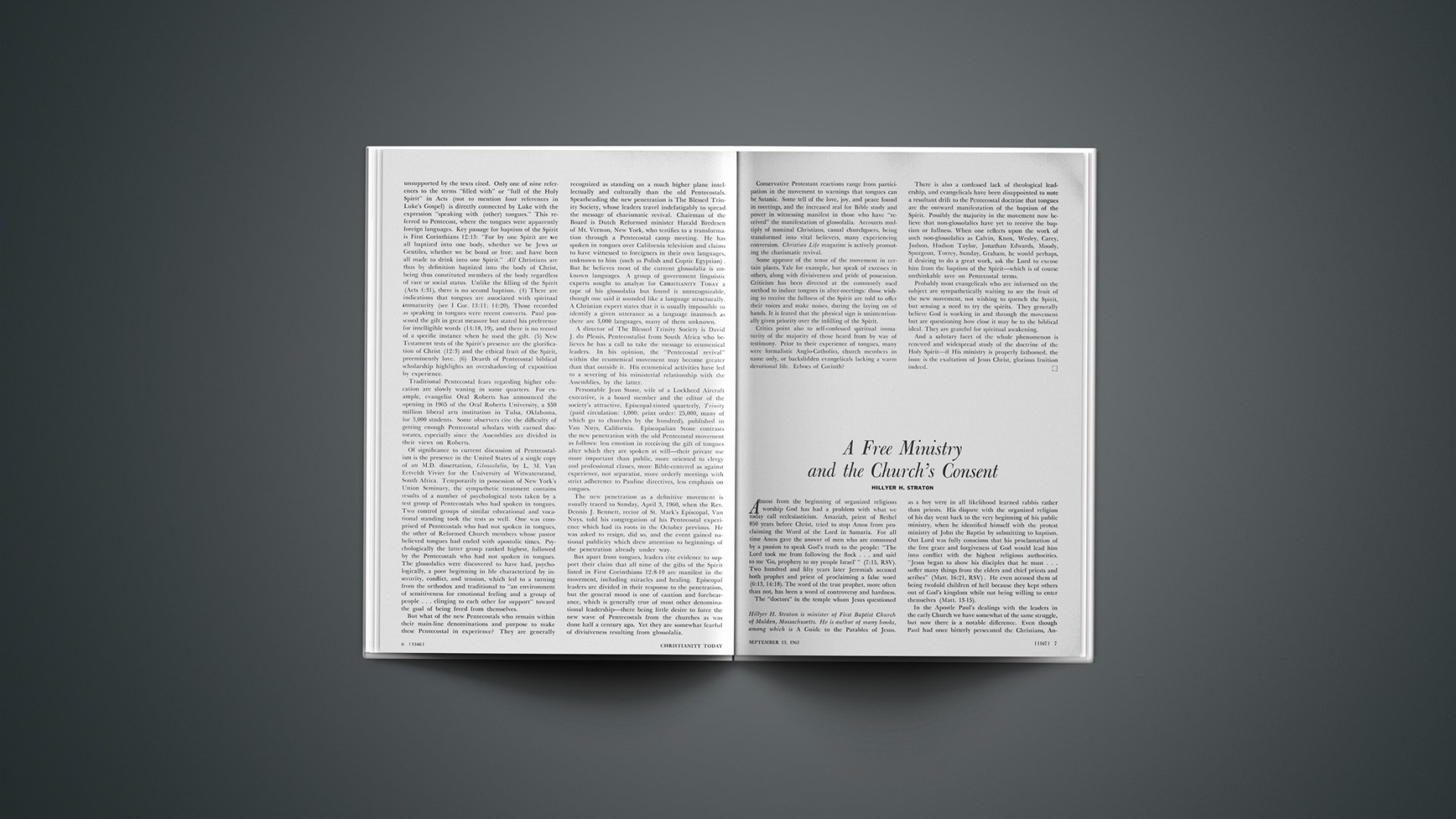Almost from the beginning of organized religious worship God has had a problem with what we today call ecclesiasticism. Amaziah, priest of Bethel 850 years before Christ, tried to stop Amos from proclaiming the Word of the Lord in Samaria. For all time Amos gave the answer of men who are consumed by a passion to speak God’s truth to the people: “The Lord took me from following the flock … and said to me ‘Go, prophesy to my people Israel’ ” (7:15, RSV). Two hundred and fifty years later Jeremiah accused both prophet and priest of proclaiming a false word (6:13; 14:18). The word of the true prophet, more often than not, has been a word of controversy and hardness.
The “doctors” in the temple whom Jesus questioned as a boy were in all likelihood learned rabbis rather than priests. His dispute with the organized religion of his day went back to the very beginning of his public ministry, when he identified himself with the protest ministry of John the Baptist by submitting to baptism. Out Lord was fully conscious that his proclamation of the free grace and forgiveness of God would lead him into conflict with the highest religious authorities. “Jesus began to show his disciples that he must … suffer many things from the elders and chief priests and scribes” (Matt. 16:21, RSV). He even accused them of being twofold children of hell because they kept others out of God’s kingdom while not being willing to enter themselves (Matt. 13–15).
In the Apostle Paul’s dealings with the leaders in the early Church we have somewhat of the same struggle, but now there is a notable difference. Even though Paid had once bitterly persecuted the Christians, Ananias of Damascus was ready to receive Paul because of the guidance of the Holy Spirit (Acts 9:10–17). Some years later at the Jerusalem conference (Acts 15) the ministry of Paul and Barnabas was confirmed, again through the Holy Spirit’s guidance (Acts 15:28). It is instructive that the Jerusalem church leaders had certain standards which they enjoined upon Paul and Barnabas (Acts 15:28, 29). The church was exerting some “control,” and Paul accepted this in the best of spirit.
The New Testament Church was not a church of anarchy, with every man doing that which was right in his own eyes. The evidence indicates that there were standards for the ministry. The pastoral epistles are filled with injunction and instruction for the faithful minister of Jesus Christ. Not every claimant to apostolic witness or power was to be accepted; Peter’s controversy with Simon Magus in Acts 8 is clear proof. Christians were enjoined to “try the spirits” to see if they were of God. Early Christians were peculiarily open to the guidance of the Holy Spirit. Those established in the ministry wished to be assured that ministers following them would pass on as they had received “the faith once for all delivered to the saints.” Paul warned against those who were perverting his Gospel (Phil 3:19). Ordination procedures with the laying on of hands from the older to the younger minister were a part of the process of “confirming” what the Holy Spirit had been doing in the life of the candidate.
The problem the Church has had in the past, has at the present moment, and certainly will have in the future is to find the happy medium between “control” and anarchy, between authoritarianism that denies the freedom of the Spirit of God in choosing whom he will to do his work and individual license in proclaiming every vagary that a fertile imagination or frustrated ambition can conceive. The latter type of “freedom” has led to various types of pseudo-Christianity in Africa. Standards are necessary, but they must be held in a creative tension that does not bind the Spirit. Factors certainly involved are: (1) the teachings of the New Testament; (2) the mind of Christ; and (3) God given intelligence. Some Christian thinkers would add the findings of the first four councils of the church, especially the Nicene and Chalcedonian confessions of faith.
In connection with number three above, I remember vividly an incident in the 1920s connected with the ministry of my father, John Roach Straton, who had a reputation in that day as a defender of the faith. A young man had come to him and said, “I want to preach.” My father in questioning him discovered that he had not finished high school, much less college or seminary. So his advice was to complete all three. The fellow replied, “But I believe that God will fill my mouth.” Father responded, “Yes, God will fill your mouth if you fill your head first.” Yet father did more to back the evangelistic efforts of Uldine Utley in New York City and environs than any other minister of that decade. To him as well as many others the Holy Spirit had “confirmed” the witness of Uldine, and this was the final touchstone.
The problem of “consent” arose in the recent meeting of Faith and Order in Montreal, and the writer had a small part in standing for freedom. A section report on “The Redemptive Work of Christ and the Ministry,” although acknowledging the guidance of the Holy Spirit, contained the words: “In any case the exercise of the special ministry requires the consent of the Church” (italics mine). This seemed a dangerous constriction of the work of the Holy Spirit. Roger Williams was driven into the wilderness because he would not bow to the “consent” of a local church in Massachusetts. Under such control John Wesley would never have been able to make his witness that has so blessed the church universal, nor could Dwight L. Moody have carried his Gospel message around the world.
There is no easy answer to the problem save eternal vigilance on the part of the people of God, who surely is on the side of freedom. There must be a place in the Church for those who will make their witness in unusual ways. It behooves Christian leaders to keep themselves open to the divine Spirit. While there must be standards, still the ultimate test is: “by their fruits you will know them.” When fruits are evident the church can “confirm” to its own blessing a ministry upon which God has already put his benediction.
FACING DEATH
Over the Red Sea going,
Tomorrow, or probably Monday;
Over the Red Sea going—
God takes care of his own.
Over the Red Sea blowing,
The way may open on Sunday;
Over the Red Sea blowing—
God makes way for his own.
Be it today or tomorrow
Moses raises his rod,
Stand we ready on this side,
Stands on the other side—God.
Safe is the watery pathway,
No one treads it alone;
Over the Red Sea going—
God takes care of his own.
EARL L. DOUGLASS










